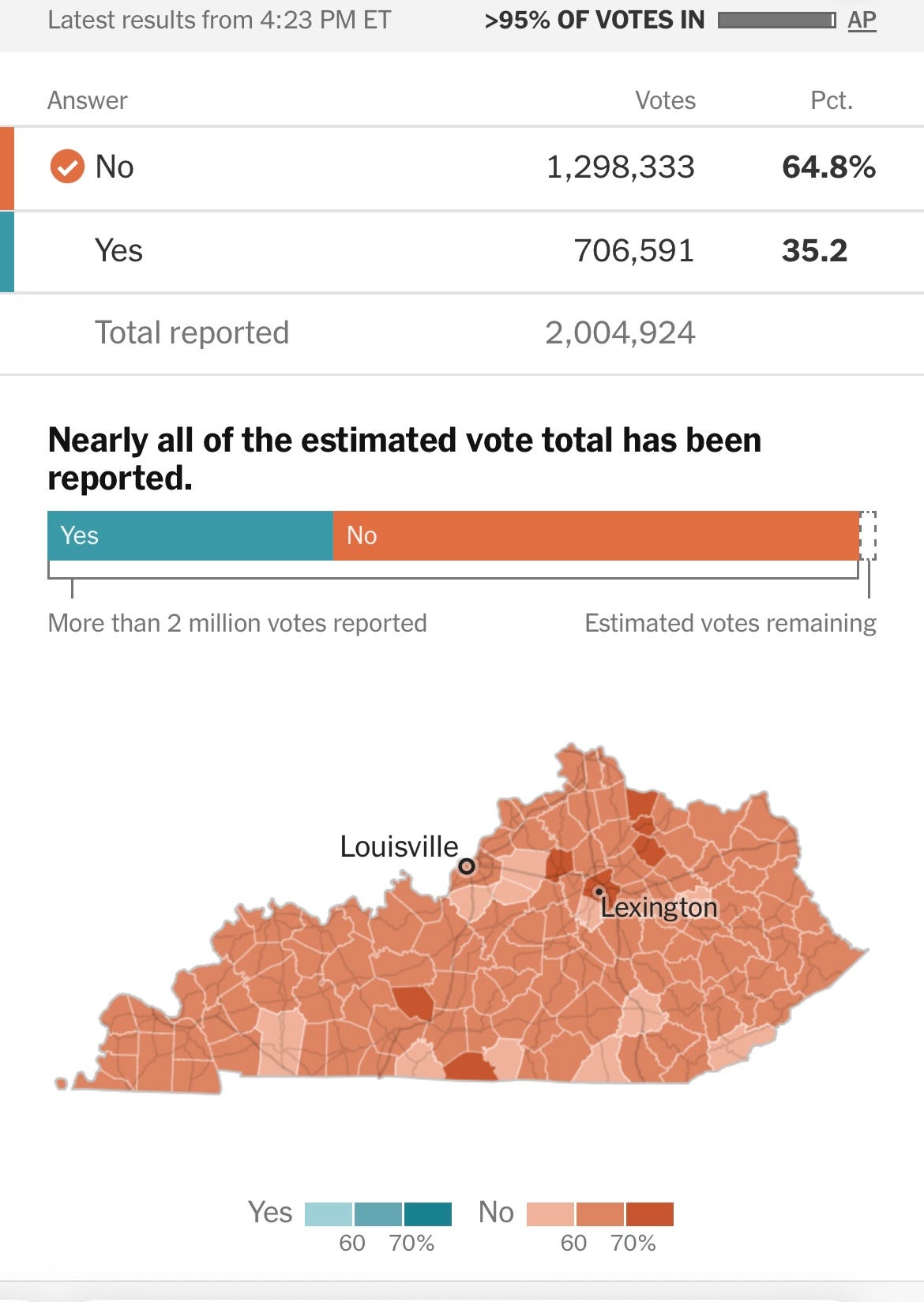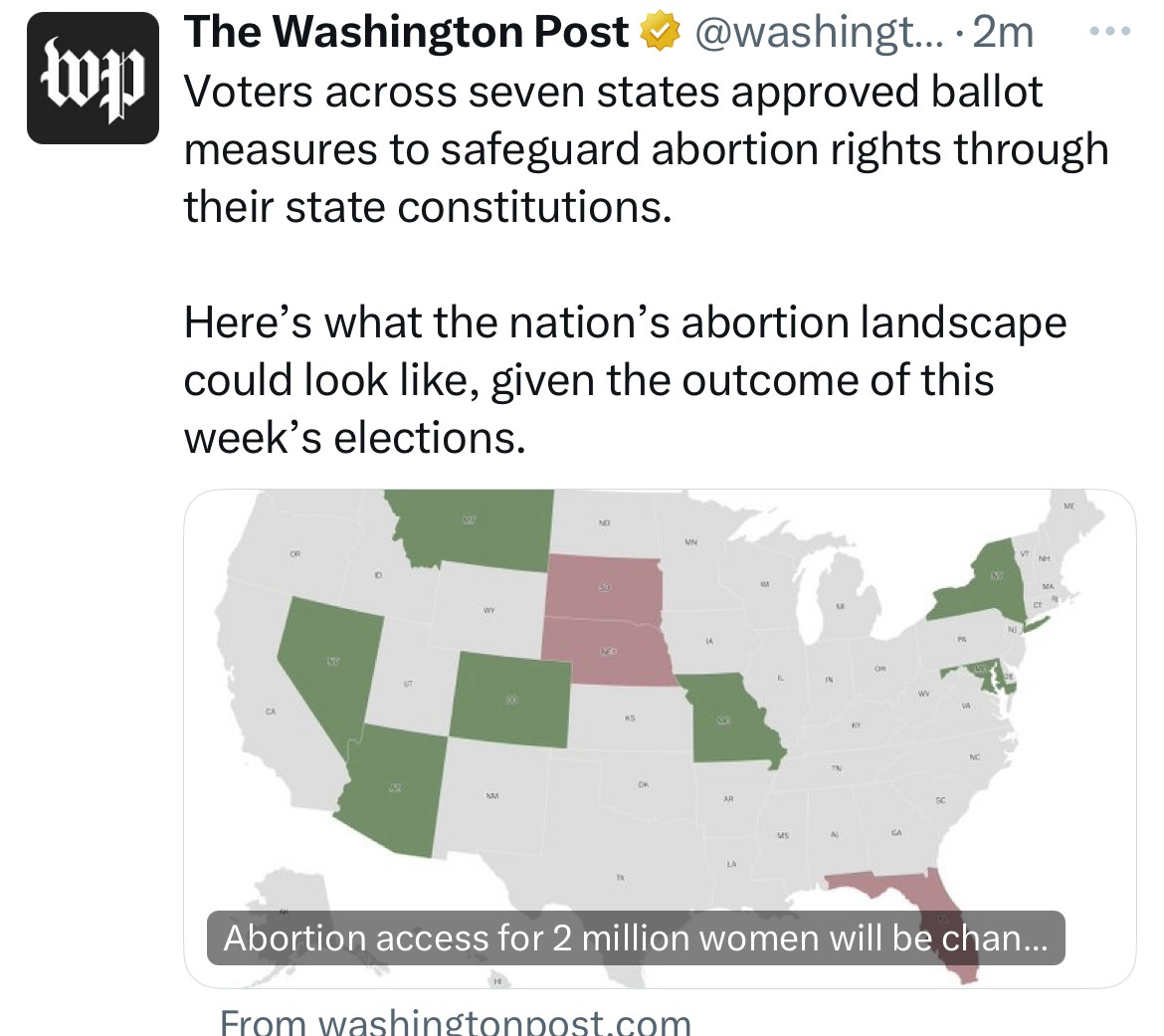My first reaction after a tough national election is NOT to rush to analyze it all at once. Or spin it, one way or another. Or lash out with blame.
There is so much to absorb and take in, I find it better to escape the noise, take some time, read a wide variety of accounts and perspectives, analyze data (so far, it’s pretty stunning/sobering), and put it all together as best I can.
I’m doing the same now.
So in addition to spending the coming weeks preparing and presenting ways to protect key elements of our nation from an onslaught that will no doubt come fast and furious (some awful combination of Trump and Vance’s clear promises, Project 2025, etc.), I’ll be taking in as much input and data as possible, and will share it with all of you. (Feel free to share any thoughts/accounts/perspectives you are finding helpful at the moment.)
Still, a couple thoughts for the moment:
History
At the highest level, far above the back and forth events of the election cycle (and given how wild the cycle was, it’s hard to see beyond those events right now), all that we’re living through is situated amid the long arc of American history.
And any unvarnished look at that history evinces a clear and brutal pattern—that every time there are advances in growing a diverse democracy, a fierce backlash erupts against that progress.
Every time.
And the more I dig into the too-overlooked backlash to a more diverse American democracy in the late 1800s and early 1900s, the more disturbed I am by the similarities to today. Want just one example? Coordinated bomb threats targeted majority-minority communities in key swing states much of Tuesday. (Along with racist texts being sent all over America today). That type of racially targeted threat of violence comes directly out of the playbook that crushed Reconstruction in the late 1800s and led to Jim Crow. And the fact that it’s happening in 2024 is not only horrible, but hardly being discussed.
No responsible analysis of what has happened in politics since 2008 can leave out these longer patterns of American history (by the way, this is often the history that some want to censor), and how this era is entirely consistent with them. First, because it’s the truth. And second, doing so makes clear that this is a long battle, that overcoming an era of backlash in a sustained way is a very difficult assignment…but also, as difficult as the assignment may be, that it can be done.
One other lesson from the pattern: failing to resist as major forces push to roll back democracy is the true death knell, risking that the retrenchment extends for generations.
Rest up, for sure. But stay in the fight. There’s no other option.
The Canary in Kentucky
Tuesday, an election was held in Kentucky on an issue that occupies the core of every level of the right-wing movement that just dominated the national election.
Both billionaires and far-right special interest groups prioritize this particular issue as paramount.
This issue is the top priority in every gerrymandered statehouse.
It’s a core plank of Project 2025.
Trump himself made it clear it’s a top priority of his.
If a Republican doesn’t toe the line on this issue, he or she will be primaried in the next election, and will likely lose.
And in Kentucky, that issue was up for a vote.
And….
…the right-wing position got absolutely destroyed.
What issue am I taking about?
The effort to push universal private vouchers. To take money from public schools and send them to private schools.
When the voters actually had a clearly presented choice, in Kentucky, on Tuesday, the issue lost…
65-35!
It lost in EVERY county.
Issue 2, as it was called, fared the worst in the smallest county in Kentucky — losing 74%-26% among the 1,086 voters who voted in Robertson County. Robertson’s county seat is Mt. Olivet, population 347.
And Issue 2 got crushed in the state’s largest county, Jefferson (home to Louisville)—losing 67%-33%.
Issue 2 managed to lose by 70-30 or worse in 8 counties; it lost by 65-35 or worse in 60 counties; it lost by by 60-40 or worse in 111 counties.
The “Yes” vote only topped 40% in 9 counties.
And to dive a little deeper, the question Kentuckians voted No so decisively on was actually framed quite positively for the “Yes” side. Framed in the way that those peddling private vouchers like to frame it: “To give parents choices in educational opportunities for their children, are you in favor of enabling the General Assembly to provide financial support for the education costs of students in kindergarten through 12th grade who are outside the system of common (public) schools by amending the Constitution of Kentucky as stated below?”
The yard signs for Yes on Issue 2 also sounded wonderful: “Putting Students First.”
And still, Issue 2 was absolutely shellacked.
By the way, similar referenda failed in Colorado (52-48) and Nebraska (repealing a voucher bill 57-43).
And all this continues a stunning streak—no referendum establishing universal vouchers has ever won.
Why It Matters
I don’t just bring this up to laud the voters of Kentucky for seeing through what has emerged as a scam in state after state, including Ohio.
I bring it up because it tells us something.
Again, the push for universal vouchers is at the heart of the conservative agenda. At all levels, everywhere. And when voters had a direct choice, it got absolutely clobbered across the board.
But universal vouchers are not the only issue where this is the case.
The attack on abortion access is another central plank in the far right’s agenda, and it too was rejected in numerous places on Tuesday. Voters passed seven ballot measures on abortion rights across the country; in Florida, a strong majority supported those rights, but fell short of the 60% threshold.
And beyond universal vouchers and abortion access, I think it’s safe to say that almost all the specific promises made by the far right and in Project 2025 are equally toxic—which is why Trump and Vance ran away from most of them so quickly. Have no doubt, many of these ideas will be acted upon in the coming months.
But if we were to pull each of them out and demand a referendum on them, my guess they would almost all fare poorly.
All of this is of course frustrating, but also illuminating.
The far right is embracing toxic issues. The people oppose them…strongly. They vote accordingly when presented with those issues. Yet our candidates struggle to beat the very candidates pushing those policies despite how unpopular they are. Including in the very states where these toxic policies are being pushed.
In a very simplistic way, this disconnect between the underlying issues and the candidates/parties highlights a gap we must close.
It highlights an opportunity we are clearly not seizing.
There’s so much we need to do to grab that opportunity.
It’s about organizing. Running in more places. The broader brand of the party. What we do when we’re in office—what issues we focus on and fight for, and fight against. And messaging.
Speaking of messaging, I saw some of the ads on Kentucky’s Issue 2 because Northern Kentucky is in the Cincinnati media market. And they were so damn simple. They featured a teacher. And she stated plainly that public money should not be spent on private schools. They reiterated a simple message: “Public funds for public schools.” Period.
And that won.
Simple. First principles. Common sense. Appealing to communities across a diverse state, from the largest county to the smallest. Leveraging inherent trust in public schools and public school teachers.
If it can be done for issues, it should be possible for candidates.
And if we want to turn things around, failure to do this is not an option.






Sarah Huckabee Sanders signed the Learns Act into law in Arkansas recently. It increases the starting/minimum salaries of teachers-giving her a way to trick the People into voting for the bill. It’s a school voucher program, taking out tax dollars meant for public schools and giving the money to homeschoolers (mostly christian) and private schools (also mostly christian). It’s disgraceful, just as she is. She is a stain on Arkansas, just as her father before her.
We need to own messaging/communicating better.
Love the single issue with simple presentation. Our issue 1 would have benefitted from this.
I see room for short videos for more complicated topics (think School House Rock) placed across many platforms well before the election cycle. These would target educating voters who might typically get a lot of misinformation designed to confuse or brainwash.
Clearly the republicans have managed to sway a lot of people using lies. Perhaps there is a way to reach these folks with truth?